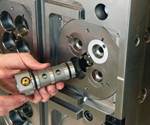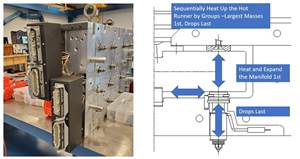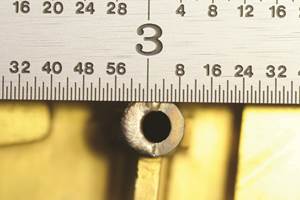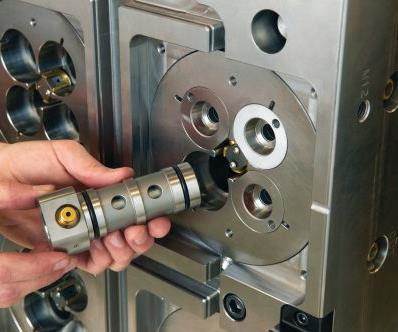In the Trenches: Taking Mold Repair to the Next Level
Improving mold repair efforts— whether you’re on the bench or managing—is not only a worthy goal, but also holds its own reward.
How do you take mold repair to the next level? Is it better tracking mechanisms? Is it improved systems or processes? Is it improving the skills of the workforce? Is it being smarter or working harder? If I ask the right question, will it finally click? What is the right question? Does this require a paradigm shift? Why would I—should I want to—repair molds better (whatever that means) faster, more effectively, more efficiently?
After almost a year, I found this list of questions that I had written down to stimulate my thinking about improving what I do on a daily basis. Several thoughts occurred to me almost immediately: hubris, cliché and group think, primarily. I’ll leave it up to you to imagine what part hubris played in my reaction—my personal demons won’t add anything helpful to the discussion.
Thought is almost always the progenitor of change and improvement. Well, change may happen accidentally, but improvement is never an accident. Regardless, I know of no better stimulus to thought than to ask questions.
Clichés and corporate catch-phrases aside, taking mold repair to the next level is a goal worth pursuing. Nobody sets a goal of being totally complacent, stagnant or unproductive. It’s in our nature to succeed and be productive, so improving mold repair efforts— whether you’re on the bench or managing—is not only a worthy goal, but also holds its own reward.
Already I’ve expressed some thoughts generated by the last question. See? I was right, questions do spark ideas. Related to this methodology, I recently read a book that addresses the issue of asking the right questions.
“Why? “Who?” and “When?” are rarely good questions because the answers are always the same: “It doesn’t matter.” “Me.” and “Now”. Better questions begin with “What?” and “How?” as in “What can I do to improve the situation?” and “How can I help?”
So, with a critical eye toward my own questions, here are a four more nuggets in no particular order.
1. It’s smarter and more diligently, but probably not harder.
Whew, that was an easy one to answer. What does harder mean in reference to work? More physical and exhausting? Mold repair is not physically exhausting work. That’s not to say that at the end of the day you don’t go home spent. The exhaustion is mental. Your mind often has to be totally engaged in problem solving, decision making and painstaking execution. I know it’s trite, but the definition of insanity is doing the same thing over and over, and expecting different results.
Working smarter means being cognizant of the instances in which you’re doing what you know will work in the short term, but ultimately will be ineffective in eliminating the problem. Taking a step back and saying, “I’ve done this before (numerous times), so what can I do differently to correct this problem, so I don’t have to stand here tomorrow and do the same thing again?
2. Better tracking mechanisms?
You bet. Steve Johnson has a slogan “Track the past, improve the future.” And it’s true. If you do repair work in a void or the often faulty theater of your memory, you may get lucky and hit a bulls-eye, but more likely you’ll just take another stab in the dark. Tracking data and analyzing it will help you make more informed (more intelligent) decisions.
I shy away from making emphatic statements because on more than one occasion I’ve been wrong, but let me state this emphatically, “You will not improve the overall performance of your mold repair efforts without documenting issues, corrective actions and results, and analyzing the data.”
3. By improving the skills of the workforce?
Do I even need to ask? Mold repair entails its own unique set of skills, how could improving those skills not help to reach the goal of taking mold repair to the next level? Identify the skills needed in your particular setting. Is it troubleshooting, machining, polishing, electrical knowledge, etc.? Hint, it’s probably not basic mechanical skills like righty tighty, lefty loosey. If it goes that deep, you may indeed need new people.
4. Paradigm shift?
Yeah, probably, but more commonly it’s called changing the culture. Once you’ve taken a critical view of your operation and have come to the conclusion that it’s not all that, the only alternative is to change—change something, anything. What you’ve done in the past is not achieving your goal, so change. Change is good. Anything you change, changes the culture because the culture is just the cumulative state of interpersonal dynamics and processes. Changing any part of either, changes the culture.
Be your own best friend—as opposed to being your own worst enemy—and initiate change. Don’t allow yourself to be pushed into it, and if you are pushed into change, don’t fight it. Go with it. Don’t let the unhappy experience of external pressure be the force that moves you into uncharted waters. Determine your own course of proactive improvements driven by an intentional plan. New and Improved is around the corner at Change and Status-quo. If you go straight through that intersection, the scenery will look much the same tomorrow as it did yesterday.
Contributor:
James Bourne is a tool repair supervisor and freelance writer.
For more information:
James Bourne
(573) 701-9123 / jamesancil.bourne@yahoo.com
Related Content
Think Safety: Eliminate Hazards Throughout the Shop
The tooling community is taking advantage of new products for safer mold shops and molding facilities.
Read MoreThe Ins and Outs of Hot Runner Temperature Control
A training checklist that explains the why and how of proper hot runner temperature control and system management.
Read MoreLaser Welding Versus Micro Welding
The latest battle in finely detailed restoration/repair of mold materials.
Read MoreHow to Use Scientific Maintenance for More Accurate Mold and Part Troubleshooting
Discover how adopting scientific maintenance approaches helps improve mold lifespan, minimize failures, and optimize production outcomes.
Read MoreRead Next
In the Trenches: Mold Repair
In this multi-part series of articles, contributer James Bourne, a tool repair supervisor and freelance writer, shares his own personal struggles in the business, as well as lessons learned and tricks of the trade garnered along the way.
Read MoreAre You a Moldmaker Considering 3D Printing? Consider the 3D Printing Workshop at NPE2024
Presentations will cover 3D printing for mold tooling, material innovation, product development, bridge production and full-scale, high-volume additive manufacturing.
Read MoreHow to Use Strategic Planning Tools, Data to Manage the Human Side of Business
Q&A with Marion Wells, MMT EAB member and founder of Human Asset Management.
Read More

















